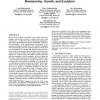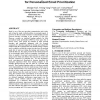319 search results - page 21 / 64 » Social Networks Under Stress |
KDD
2006
ACM
15 years 12 months ago
2006
ACM
The processes by which communities come together, attract new members, and develop over time is a central research issue in the social sciences -- political movements, professiona...
108
click to vote
KDD
2009
ACM
15 years 12 months ago
2009
ACM
Email is one of the most prevalent communication tools today, and solving the email overload problem is pressingly urgent. A good way to alleviate email overload is to automatical...
STOC
2007
ACM
15 years 11 months ago
2007
ACM
We prove and extend a conjecture of Kempe, Kleinberg, and Tardos (KKT) on the spread of influence in social networks. A social network can be represented by a directed graph where...
92
Voted
INFOCOM
2010
IEEE
14 years 10 months ago
2010
IEEE
—The success of future P2P applications ultimately depends on whether users will contribute their bandwidth, CPU and storage resources to a larger community. In this paper, we pr...
127
click to vote
WAW
2010
Springer
14 years 9 months ago
2010
Springer
We study the effect of information overload on user engagement in an asymmetric social network like Twitter. We introduce simple game-theoretic models that capture rate competition...


